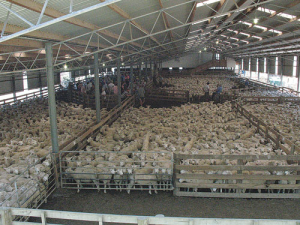NZ Catchment Groups Thrive with ‘Source to Sea’ Approach
The most successful catchment groups in NZ are those that have 'a source to sea' approach.
 NAWAC is satisfied with both the sheep and beef industries’ approaches to breeding with respect to animal welfare issues.
NAWAC is satisfied with both the sheep and beef industries’ approaches to breeding with respect to animal welfare issues.
The National Animal Welfare Advisory Committee (NAWAC) is satisfied with both the sheep and beef industries’ approaches to breeding with respect to animal welfare issues.
NAWAC’s role is to provide independent advice on animal welfare to the Minister for Primary Industries.
One subject of concern for the committee was the effects of selective breeding on the welfare of animals. NAWAC chair Dr Gwyneth Verkerk says they have worked with different sectors to understand their genetic selection parameters and how technology is being used.
In the paper just released, NAWAC gives an independent view on whether selective breeding practices used in New Zealand cause animal welfare concerns.
The report says Beef + Lamb NZ (BLNZ) sees an ethical approach to breeding as producing productive but resilient animals that handle the natural variation in feed supply and climate while producing high quality products in NZ’s range of farm environments.
“Improved longevity, calf survival and cow body condition score are the key to such resilience. In addition, control of inbreeding, which in the past led to the build-up of deleterious recessive genes and inherited diseases, emphasises the need to maintain genetic diversity,” the report says.
“Selective breeding has improved animal health in the beef cattle industry, notably selection for resistance to the facial eczema toxin and internal parasites. Selection for polled breeds obviates the need for disbudding/dehorning. Many of the negative effects of selective breeding have come from taking a narrow view of performance based on very few traits.”
BLNZ Genetics (a subsidiary of BLNZ) is doing research to develop suitable indices for a range of farming environments, the report says. These indices take a wide view of animal performance including growth, reproduction, health and disease traits. A beef progeny test similar to the central progeny test for rams is under development. Issues noted by the NZVA included:
• Elimination of several congenital diseases in Angus cattle
• Previously, heavy selection for meat production, such as the double muscling gene in Belgian Blue cattle, has produced negative outcomes such as dystocia (birthing difficulty) requiring surgical delivery of some calves.
Overall NAWAC is satisfied that the beef industry’s approach to selective breeding, focused as it is on the resilience of these animals in a variety of environments, is appropriate.
Broadly similar concerns occupy NAWAC in respect of the sheep industry.
“An ethical approach to breeding focuses on producing productive but resilient animals that handle the natural variation in feed supply and climate while producing high quality products in NZ’s range of farm environments,” the NAWAC report says.
“Improved longevity, lamb survival and ewe body condition score are the key to such resilience. In addition, control of inbreeding, which in the past led to the build-up of deleterious recessive genes and inherited diseases, emphasises the need to maintain genetic diversity.
“Selective breeding has brought significant improvements in animal health in the sheep industry, with selection for resistance to the facial eczema toxin and internal parasites. Identification of and selection away from deleterious individual genes has also been possible.”
An example is the condition Microphthalmia found primarily within the Texel breed and crosses made out of that breed, which results in blindness due to extremely small eyes – or no eyes, the report says.
Whereas in the past increased fecundity led to lower lamb survival, farmers can now select for improved lamb survival, setting a maximum reproductive rate they believe to be sustainable for their farming system.
“There has been considerable selection for increased growth rates and carcase leanness in sheep. On the other side of that, there is anecdotal evidence that the selection for leanness in slaughter animals has produced breeding ewes that have lower fat reserves, which can impact negatively during times when feed supply is restricted.
“Work is underway investigating increasing fatness in lamb carcases to improve eating quality.
“BLNZ Genetics sees that many of the negative effects of selective breeding have come from taking a narrow view of performance based on very few traits, and is doing research on animal welfare issues associated with selective breeding to develop suitable indexes for a range of farming environments. These indexes take a wide view of animal performance including growth, reproduction, health and disease traits.”
NAWAC says it is satisfied the sheep industry’s approach to selective breeding, focused as it is on the resilience of these animals in a variety of environments, is appropriate.
Former Fonterra executive Alex Turnbull has been appointed CEO to lead all five Yili Oceania Business Division companies in New Zealand.
Fonterra executive René Dedoncker is leaving the co-operative later this year to lead Australian agribusiness Elders.
Alliance Group and the Southland Stags rugby team have joined forces in a partnership that will see the the meat co-operative's farmgate brand feature on players' team kits and replica jerseys.
Fonterra's plan to expand its organic programme to the South Island is being well received by farmers, the co-op says.
Voting has started for the renewal of DairyNZ's milksolids levy.
The most successful catchment groups in NZ are those that have 'a source to sea' approach.

OPINION: Here w go: the election date is set for November 7 and the politicians are out of the gate…
OPINION: ECan data was released a few days ago showing Canterbury farmers have made “giant strides on environmental performance”.